As you know, I like to do my best to comb through the new Christian books each month to see what stands out as being not only new, but also particularly notable. I received quite a number of new titles in February and narrowed the list down to the ones below. I have included the editorial description for each. I hope there’s something here that catches your eye!
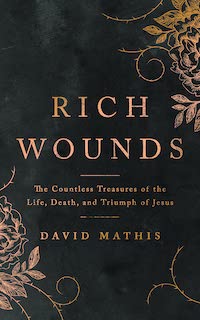 Rich Wounds: The Countless Treasures of the Life, Death, and Triumph of Jesus by David Mathis. “Thirty short but profound reflections that help you to meditate on and marvel at the sacrificial love of Jesus. These short but profound reflections from David Mathis, author of The Christmas We Didn’t Expect, will help you to look deeper at Jesus’ life, sacrificial death and spectacular resurrection—enabling you to treasure anew who Jesus is and what he has done for us. Many of us are so familiar with the Easter story that it becomes easy to miss subtle details and difficult to really enjoy its meaning. This book will help you to pause and marvel at Jesus, whose now-glorified wounds are a sign of his unfailing love and the decisive victory that he has won: “He was pierced for our transgressions, he was crushed for our iniquities; the punishment that brought us peace was on him, and by his wounds we are healed.” This book works fantastically as a devotional at any time of year. The chapters on Holy Week make it especially helpful during the Lent season and at Easter.” (Buy it from Amazon or Westminster Books)
Rich Wounds: The Countless Treasures of the Life, Death, and Triumph of Jesus by David Mathis. “Thirty short but profound reflections that help you to meditate on and marvel at the sacrificial love of Jesus. These short but profound reflections from David Mathis, author of The Christmas We Didn’t Expect, will help you to look deeper at Jesus’ life, sacrificial death and spectacular resurrection—enabling you to treasure anew who Jesus is and what he has done for us. Many of us are so familiar with the Easter story that it becomes easy to miss subtle details and difficult to really enjoy its meaning. This book will help you to pause and marvel at Jesus, whose now-glorified wounds are a sign of his unfailing love and the decisive victory that he has won: “He was pierced for our transgressions, he was crushed for our iniquities; the punishment that brought us peace was on him, and by his wounds we are healed.” This book works fantastically as a devotional at any time of year. The chapters on Holy Week make it especially helpful during the Lent season and at Easter.” (Buy it from Amazon or Westminster Books)
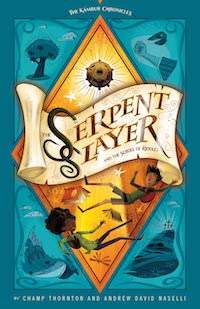 The Serpent Slayer and the Scroll of Riddles: The Kambur Chronicles by Champ Thornton & Andy Naselli. “Welcome, Traveler. You are on the Serpent Quest. To move from start to middle, Traveler, solve the riddle. What is poison to the heart? Find the answer. Make your start. Fleeing a neighborhood bully, Emmet and Nomi are pulled into an ancient quest, and now they must escape far more powerful enemies. Join them as they unlock secret riddles and follow the path of the Serpent Slayer. The Serpent Slayer and the Scroll of Riddles is a time travel adventure with a twist—middle school students will discover theological themes as they travel through God’s Word. By placing the characters into Bible events, Champ Thornton and Andrew Naselli show the Bible is far from being a boring book full of instructions. Readers will discover life-changing truths they’ll never forget.” (Buy it from Amazon or Westminster Books)
The Serpent Slayer and the Scroll of Riddles: The Kambur Chronicles by Champ Thornton & Andy Naselli. “Welcome, Traveler. You are on the Serpent Quest. To move from start to middle, Traveler, solve the riddle. What is poison to the heart? Find the answer. Make your start. Fleeing a neighborhood bully, Emmet and Nomi are pulled into an ancient quest, and now they must escape far more powerful enemies. Join them as they unlock secret riddles and follow the path of the Serpent Slayer. The Serpent Slayer and the Scroll of Riddles is a time travel adventure with a twist—middle school students will discover theological themes as they travel through God’s Word. By placing the characters into Bible events, Champ Thornton and Andrew Naselli show the Bible is far from being a boring book full of instructions. Readers will discover life-changing truths they’ll never forget.” (Buy it from Amazon or Westminster Books)
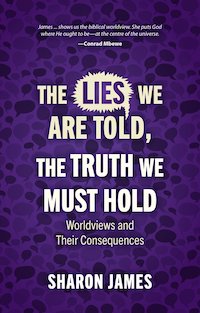 Lies We are Told, the Truth We Must Hold: Worldviews and Their Consequences by Sharon James. “We are surrounded by lies. They are incorporated into the worldview of our culture. We daily absorb them, and these lies can have deadly effects on individuals, societies and whole civilisations. Sharon James investigates the origins of some of these lies and looks at how we have got to the point where ‘my truth’ is as valid as ‘your truth’, and absolute truth is an outdated way of thinking. In examining the evidence of history, she highlights the consequences of applying dangerous untruths. She also looks at how Christians often respond to the culture’s lies – in silence, acquiescence or celebration of them – and why these responses can be as harmful as the lies themselves. In the second part she turns to the truth which leads to real liberation and justice. She shows why we don’t need to be ashamed of Christ, or intimidated by the claims of those who are militantly opposed to the Bible. This book aims to equip Christians to navigate the minefield of current claims. To understand our inherent human significance, to know genuine freedom, and to work for real justice, we need to know the truth.” (Buy it from Amazon or Westminster Books)
Lies We are Told, the Truth We Must Hold: Worldviews and Their Consequences by Sharon James. “We are surrounded by lies. They are incorporated into the worldview of our culture. We daily absorb them, and these lies can have deadly effects on individuals, societies and whole civilisations. Sharon James investigates the origins of some of these lies and looks at how we have got to the point where ‘my truth’ is as valid as ‘your truth’, and absolute truth is an outdated way of thinking. In examining the evidence of history, she highlights the consequences of applying dangerous untruths. She also looks at how Christians often respond to the culture’s lies – in silence, acquiescence or celebration of them – and why these responses can be as harmful as the lies themselves. In the second part she turns to the truth which leads to real liberation and justice. She shows why we don’t need to be ashamed of Christ, or intimidated by the claims of those who are militantly opposed to the Bible. This book aims to equip Christians to navigate the minefield of current claims. To understand our inherent human significance, to know genuine freedom, and to work for real justice, we need to know the truth.” (Buy it from Amazon or Westminster Books)
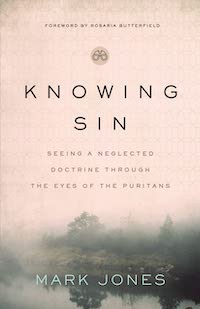 Knowing Sin: Seeing a Neglected Doctrine Through the Eyes of the Puritans by Mark Jones. “We don’t talk a lot about sin these days. But maybe we should. The Puritans sure did—because they understood sin’s deceptive power and wanted to root it out of their lives. Shouldn’t we want the same? Though many books have been written on the “doctrine of sin,” few are as practical and applicable as this one. In Knowing Sin, Mark Jones puts his expertise in the Puritans to work by distilling the vast wisdom of our Christian forebears into a single volume that summarizes their thought on this vital subject. The result isn’t a theological tome to sit on your shelf and gather dust, but a surprisingly relevant book to keep by your bedside and refer to again and again. You’ll come to understand topics like: Sin’s Origin; Sin’s Grief; Sin’s Thoughts; Sin’s Temptations; Sin’s Misery; Sin’s Secrecy; and of course … Sin’s Defeat! None of us is free from the struggle with sin. The question isn’t whether we’re sinful, it’s what we’re doing about it. Thanks be to God, there is a path to overcoming sin. And the first step on that path to victory is knowing what we’re up against. Start Knowing Sin today!” (Buy it from Amazon or Westminster Books)
Knowing Sin: Seeing a Neglected Doctrine Through the Eyes of the Puritans by Mark Jones. “We don’t talk a lot about sin these days. But maybe we should. The Puritans sure did—because they understood sin’s deceptive power and wanted to root it out of their lives. Shouldn’t we want the same? Though many books have been written on the “doctrine of sin,” few are as practical and applicable as this one. In Knowing Sin, Mark Jones puts his expertise in the Puritans to work by distilling the vast wisdom of our Christian forebears into a single volume that summarizes their thought on this vital subject. The result isn’t a theological tome to sit on your shelf and gather dust, but a surprisingly relevant book to keep by your bedside and refer to again and again. You’ll come to understand topics like: Sin’s Origin; Sin’s Grief; Sin’s Thoughts; Sin’s Temptations; Sin’s Misery; Sin’s Secrecy; and of course … Sin’s Defeat! None of us is free from the struggle with sin. The question isn’t whether we’re sinful, it’s what we’re doing about it. Thanks be to God, there is a path to overcoming sin. And the first step on that path to victory is knowing what we’re up against. Start Knowing Sin today!” (Buy it from Amazon or Westminster Books)
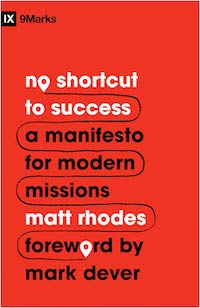 No Shortcut to Success: A Manifesto for Modern Missions by Matt Rhodes. “Trendy new missions strategies are a dime a dozen, promising missionaries monumental results in record time. These strategies report explosive movements of people turning to Christ, but their claims are often dubious and they do little to ensure the health of believers or churches that remain. How can churches and missionaries address the urgent need to reach unreached people without falling for quick fixes? In No Shortcut to Success, author and missionary Matt Rhodes implores Christians to stop chasing silver-bullet strategies and short-term missions, and instead embrace theologically robust and historically demonstrated methods of evangelism and discipleship―the same ones used by historic figures such as William Carey and Adoniram Judson. These great missionaries didn’t rush evangelism; they spent time studying Scripture, mastering foreign languages, and building long-term relationships. Rhodes explains that modern missionaries’ emphasis on minimal training and quick conversions can result in slipshod evangelism that harms the communities they intend to help. He also warns against underestimating the value of individual skill and effort―under the guise of “getting out of the Lord’s way”―and empowers Christians with practical, biblical steps to proactively engage unreached groups.” (Buy it from Amazon or Westminster Books)
No Shortcut to Success: A Manifesto for Modern Missions by Matt Rhodes. “Trendy new missions strategies are a dime a dozen, promising missionaries monumental results in record time. These strategies report explosive movements of people turning to Christ, but their claims are often dubious and they do little to ensure the health of believers or churches that remain. How can churches and missionaries address the urgent need to reach unreached people without falling for quick fixes? In No Shortcut to Success, author and missionary Matt Rhodes implores Christians to stop chasing silver-bullet strategies and short-term missions, and instead embrace theologically robust and historically demonstrated methods of evangelism and discipleship―the same ones used by historic figures such as William Carey and Adoniram Judson. These great missionaries didn’t rush evangelism; they spent time studying Scripture, mastering foreign languages, and building long-term relationships. Rhodes explains that modern missionaries’ emphasis on minimal training and quick conversions can result in slipshod evangelism that harms the communities they intend to help. He also warns against underestimating the value of individual skill and effort―under the guise of “getting out of the Lord’s way”―and empowers Christians with practical, biblical steps to proactively engage unreached groups.” (Buy it from Amazon or Westminster Books)
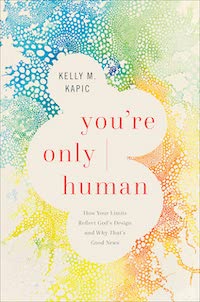 You’re Only Human: How Your Limits Reflect God’s Design and Why That’s Good News by Kelly Kapic. Work. Family. Church. Exercise. Sleep. The list of demands on our time seems to be never ending. It can leave you feeling a little guilty–like you should always be doing one more thing. Rather than sharing better time-management tips to squeeze more hours out of the day, Kelly Kapic takes a different approach in You’re Only Human. He offers a better way to make peace with the fact that God didn’t create us to do it all. Kapic explores the theology behind seeing our human limitations as a gift rather than a deficiency. He lays out a path to holistic living with healthy self-understanding, life-giving relationships, and meaningful contributions to the world. He frees us from confusing our limitations with sin and instead invites us to rest in the joy and relief of knowing that God can use our limitations to foster freedom, joy, growth, and community. Readers will emerge better equipped to cultivate a life that fosters gratitude, rest, and faithful service to God.” (Buy it from Amazon or Westminster Books)
You’re Only Human: How Your Limits Reflect God’s Design and Why That’s Good News by Kelly Kapic. Work. Family. Church. Exercise. Sleep. The list of demands on our time seems to be never ending. It can leave you feeling a little guilty–like you should always be doing one more thing. Rather than sharing better time-management tips to squeeze more hours out of the day, Kelly Kapic takes a different approach in You’re Only Human. He offers a better way to make peace with the fact that God didn’t create us to do it all. Kapic explores the theology behind seeing our human limitations as a gift rather than a deficiency. He lays out a path to holistic living with healthy self-understanding, life-giving relationships, and meaningful contributions to the world. He frees us from confusing our limitations with sin and instead invites us to rest in the joy and relief of knowing that God can use our limitations to foster freedom, joy, growth, and community. Readers will emerge better equipped to cultivate a life that fosters gratitude, rest, and faithful service to God.” (Buy it from Amazon or Westminster Books)
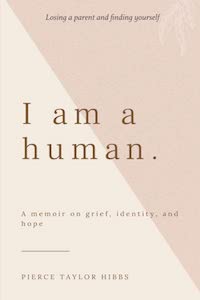 I Am a Human: A Memoir on Grief, Identity, and Hope by Pierce Taylor Hibbs. “Losing a parent can reveal much about who you are. Award-winning Christian author Pierce Taylor Hibbs (author of Struck Down but Not Destroyed and Finding Hope in Hard Things) offers a concise and gripping memoir that chronicles his spiritual journey through losing his father at a young age. In a narrative that blends prose, art, and intimacy, he shows four things grief has taught him about being a human: transience, limitation, perspective, and hope. The memoir works through these words in relation to his father’s death, drawing out deep spiritual observations that serve to remind readers who they are. Hibbs takes what is a universal experience and makes it tangible for readers without removing its relevance for their own lives. These are words to be felt and experienced, not merely read.” (Buy it from Amazon)
I Am a Human: A Memoir on Grief, Identity, and Hope by Pierce Taylor Hibbs. “Losing a parent can reveal much about who you are. Award-winning Christian author Pierce Taylor Hibbs (author of Struck Down but Not Destroyed and Finding Hope in Hard Things) offers a concise and gripping memoir that chronicles his spiritual journey through losing his father at a young age. In a narrative that blends prose, art, and intimacy, he shows four things grief has taught him about being a human: transience, limitation, perspective, and hope. The memoir works through these words in relation to his father’s death, drawing out deep spiritual observations that serve to remind readers who they are. Hibbs takes what is a universal experience and makes it tangible for readers without removing its relevance for their own lives. These are words to be felt and experienced, not merely read.” (Buy it from Amazon)
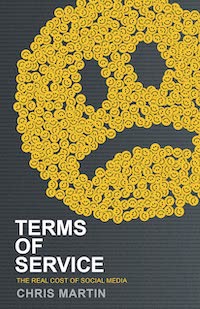 Terms of Service: The Real Cost of Social Media by Chris Martin. “Do we use social media, or are we being used by it? Social media is brilliant and obscene. It sharpens the mind and dulls it. It brings nations together and tears them apart. It perpetuates, reveals, and repairs injustice. It is an untamed beast upon which we can only hope to ride, but never quite corral. What is it doing to us? In Terms of Service, Chris Martin brings readers his years of expertise and experience from building online brands, coaching authors and speakers about social media use, and thinking theologically about the effects of social media. As you read this book, you will: Learn how social media has come to dominate the role the internet plays in your life; Learn how the ‘social internet’ affects you in ways you may not realize; Be equipped to push back against the hold the internet has on your mind and your heart.” (Buy it from Amazon or Westminster Books)
Terms of Service: The Real Cost of Social Media by Chris Martin. “Do we use social media, or are we being used by it? Social media is brilliant and obscene. It sharpens the mind and dulls it. It brings nations together and tears them apart. It perpetuates, reveals, and repairs injustice. It is an untamed beast upon which we can only hope to ride, but never quite corral. What is it doing to us? In Terms of Service, Chris Martin brings readers his years of expertise and experience from building online brands, coaching authors and speakers about social media use, and thinking theologically about the effects of social media. As you read this book, you will: Learn how social media has come to dominate the role the internet plays in your life; Learn how the ‘social internet’ affects you in ways you may not realize; Be equipped to push back against the hold the internet has on your mind and your heart.” (Buy it from Amazon or Westminster Books)
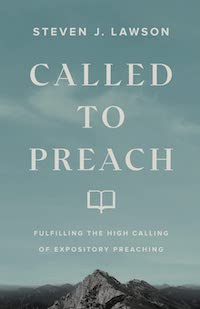 Called to Preach: Fulfilling the High Calling of Expository Preaching by Steven Lawson. “The church stands in dire need of those God has called to preach the word with precision and power. Preachers who will not replace sound theology with culturally palatable soundbites. Preachers who will clearly and faithfully share the gospel and inspire those in their churches to live godly lives. Through in-depth biblical analysis and inspiring examples from church history, Steven J. Lawson paints a picture of God’s glory magnified through faithful preaching, reclaiming the high ground of biblical preaching for the next generation. With helpful advice and practical guidance gleaned from his fifty years in ministry, Lawson will help you know if you are called to preach; understand the qualifications for ministry; develop, improve, and deliver strong expository sermons. The church is at its strongest when the word is being faithfully proclaimed. Will you heed the call?” (Buy it from Amazon or Westminster Books)
Called to Preach: Fulfilling the High Calling of Expository Preaching by Steven Lawson. “The church stands in dire need of those God has called to preach the word with precision and power. Preachers who will not replace sound theology with culturally palatable soundbites. Preachers who will clearly and faithfully share the gospel and inspire those in their churches to live godly lives. Through in-depth biblical analysis and inspiring examples from church history, Steven J. Lawson paints a picture of God’s glory magnified through faithful preaching, reclaiming the high ground of biblical preaching for the next generation. With helpful advice and practical guidance gleaned from his fifty years in ministry, Lawson will help you know if you are called to preach; understand the qualifications for ministry; develop, improve, and deliver strong expository sermons. The church is at its strongest when the word is being faithfully proclaimed. Will you heed the call?” (Buy it from Amazon or Westminster Books)
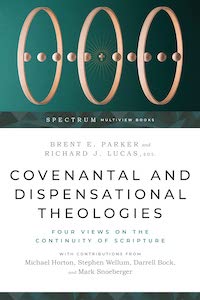 Covenantal and Dispensational Theologies: Four Views on the Continuity of Scripture edited by Brent Parker & Richard Lucas. “How does the canon of Scripture fit together? For evangelical Christians, there is no question about the authority of Scripture and its testimony to the centrality of Jesus Christ in God’s salvation plan. But several questions remain: How do the Old Testament and New Testament relate to each other? What is the relationship among the biblical covenants? How should Christians read and interpret Scripture in order to do justice to both its individual parts and its whole message? How does Israel relate to the church? In this volume in IVP Academic’s Spectrum series, readers will find four contributors who explore these complex questions. The contributors each make a case for their own view―representing two versions of covenantal theology and two versions of dispensational theology―and then respond to the others’ views to offer an animated yet irenic discussion on the continuity of Scripture.” (Buy it from Amazon or Westminster Books)
Covenantal and Dispensational Theologies: Four Views on the Continuity of Scripture edited by Brent Parker & Richard Lucas. “How does the canon of Scripture fit together? For evangelical Christians, there is no question about the authority of Scripture and its testimony to the centrality of Jesus Christ in God’s salvation plan. But several questions remain: How do the Old Testament and New Testament relate to each other? What is the relationship among the biblical covenants? How should Christians read and interpret Scripture in order to do justice to both its individual parts and its whole message? How does Israel relate to the church? In this volume in IVP Academic’s Spectrum series, readers will find four contributors who explore these complex questions. The contributors each make a case for their own view―representing two versions of covenantal theology and two versions of dispensational theology―and then respond to the others’ views to offer an animated yet irenic discussion on the continuity of Scripture.” (Buy it from Amazon or Westminster Books)










